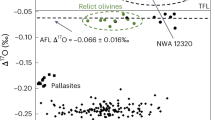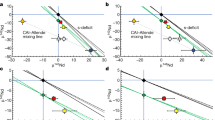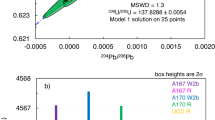Abstract
The isotope 176Lu (2.6% of natural lutetium) decays by β− to 176Hf, with a long half life. We present here the first Lu–Hf isochron. The eucrite meteorites, a suite of planetary igneous rocks of known age, 4,550 Myr, define a 10-point total-rock isochron with a slope of 0.0934 ± 40, leading to a value of 3.53 ± 0.14 ×1010yr for the β−-decay half life of 176Lu. The isochron intercept of 0.27973 ± 12 gives the initial 176Hf/177Hf for the inner Solar System at the time of accretion.
This is a preview of subscription content, access via your institution
Access options
Subscribe to this journal
Receive 51 print issues and online access
$199.00 per year
only $3.90 per issue
Buy this article
- Purchase on Springer Link
- Instant access to full article PDF
Prices may be subject to local taxes which are calculated during checkout
Similar content being viewed by others
References
Herr, W., Merz, E., Eberhardt, P. & Signer, P. Z. Naturf. 13a, 268–273 (1958).
Boudin, A. & Deutsch, S. Science 168, 1219–1220 (1970).
Faure, G. Principles of Isotope Geology (Wiley, New York, 1977).
Dixon, D., McNair, A. & Curran, S. C. Phil. Mag. 45, 683–684 (1954).
Duke, M. B. & Silver, L. T. Geochim. cosmochim. Acta 31, 1637–1665 (1967).
Stolper, E. Geochim cosmochim. Acta 41, 587–611 (1977).
Consolmagno, G. J. & Drake, M. J. Geochim. cosmochim. Acta 41, 1271–1282 (1977).
Papanastassiou, D. A. & Wasserburg, G. J. Earth planet. Sci. Lett. 5, 361–376 (1969).
Birck, J. L. & Allègre, C. J. Earth planet. Sci. Lett. 39, 37–51 (1978).
Unruh, D. M., Nakamura, N. & Tatsumoto, M. Earth planet. Sci. Lett. 37, 1–12 (1977).
Lugmair, G. W. Meteoritics 9, 369 (1974).
Nakamura, N., Unruh, D. M., Gensho, R. & Tatsumoto, M. Lunar Sci. VIII Abstr. 712–713 (1977).
Lugmair, G. W., Scheinin, N. B. & Carlson, R. W. Meteoritics 12, 300–301 (1977).
Hamet, J., Nakamura, N., Unruh, D. M. & Tatsumoto, M. Proc. 9th Lunar Sci. Conf. 1115–1136 (1978).
Patchett, P. J. & Tatsumoto, M. Contr. Miner. Petrol, (in the press).
York, D. Earth planet. Sci. Lett. 5, 320–324 (1969).
Ehmann, W. D., Chyi, L. L., Garg, A. N. & Ali, M. Z. in Origin and Distribution of the Elements Vol. II (ed. Ahrens, L. H.) 247–259 (Pergamon, Oxford, 1977).
Shima, M. Geochim. cosmochim. Acta. 43, 353–362 (1979).
McCulloch, M. T., DeLaeter, J. R. & Rosman, K. J. R. Earth planet Sci. Lett. 28, 308–322 (1976).
Author information
Authors and Affiliations
Rights and permissions
About this article
Cite this article
Patchett, P., Tatsumoto, M. Lu–Hf total-rock isochron for the eucrite meteorites. Nature 288, 571–574 (1980). https://doi.org/10.1038/288571a0
Received:
Accepted:
Issue Date:
DOI: https://doi.org/10.1038/288571a0
This article is cited by
-
Half-life of the nuclear cosmochronometer 176Lu measured with a windowless 4π solid angle scintillation detector
Communications Physics (2023)
-
U–Pb LA-ICP-MS geochronology of polygenetic zircons from Beshta and Kamenistaya intrusions (the Greater Caucasus)
Acta Geochimica (2022)
-
Crustal rejuvenation stabilised Earth’s first cratons
Nature Communications (2021)
-
Nd-Hf Isotopic Decoupling of the Silurian—Devonian Granitoids in the Chinese Altai: A Consequence of Crustal Recycling of the Ordovician Accretionary Wedge?
Journal of Earth Science (2020)
-
The timing and duration of high-temperature to ultrahigh-temperature metamorphism constrained by zircon U–Pb–Hf and trace element signatures in the Khondalite Belt, North China Craton
Contributions to Mineralogy and Petrology (2020)
Comments
By submitting a comment you agree to abide by our Terms and Community Guidelines. If you find something abusive or that does not comply with our terms or guidelines please flag it as inappropriate.



